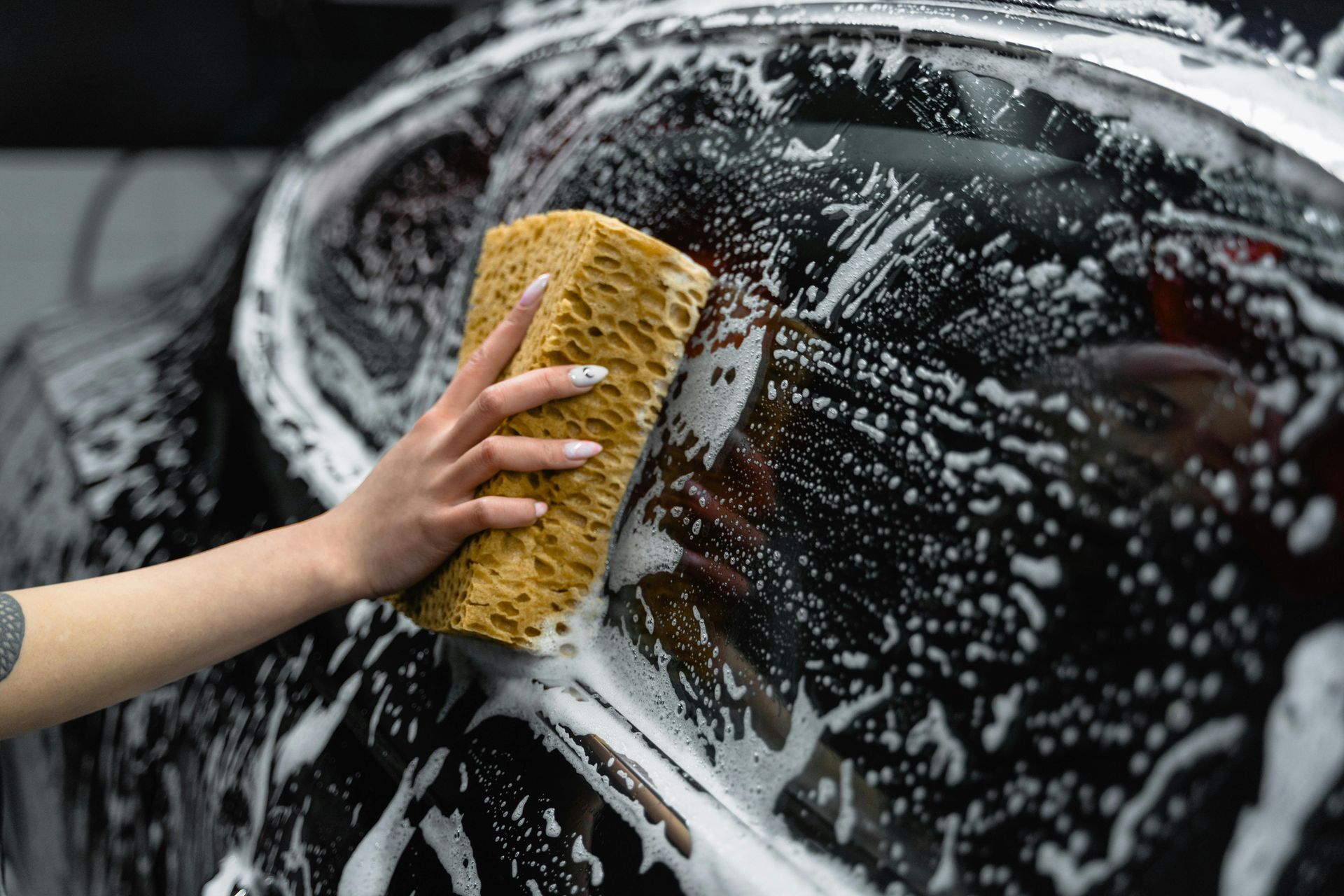Signs Your Brakes Need Attention: A Guide for Ann Arbor Residents
Your vehicle's braking system is arguably its most crucial safety feature. In a vibrant city like Ann Arbor, MI, where we navigate bustling streets, unpredictable weather, and everything in between, having reliable brakes is non-negotiable. At K & N Automotive, located right here in Ann Arbor, we understand the vital role your brakes play in ensuring your safety and the safety of others on the road. That's why we've put together this comprehensive guide to help you recognize the telltale signs that your brakes might need attention.
Ignoring brake problems can lead to dangerous situations and more costly repairs down the line. As your trusted automotive partner in Ann Arbor, MI, K & N Automotive wants to empower you with the knowledge to identify potential issues early on. We believe that informed drivers make safer choices, and we're here to provide the expert service you need when those warning signs appear.
1. The Soundtrack of Trouble: Squealing or Screeching Brakes
One of the most common and often most noticeable signs of brake trouble is a high-pitched squealing or screeching sound when you apply the brakes. While occasional squealing, especially in damp conditions, might not always indicate a serious problem, persistent or loud squealing definitely warrants investigation.
- Worn Brake Pads: The most frequent culprit behind squealing brakes is worn brake pads. Many brake pads have a built-in metal wear indicator that starts to make noise when the friction material gets too thin. This is your car's way of telling you it's time for a brake pad replacement. Don't ignore this warning! Bring your vehicle to K & N Automotive in Ann Arbor, and we'll inspect your brake pads to ensure your safety.
- Dust and Debris: Sometimes, dust, dirt, or small pebbles can get lodged between the brake pad and the rotor, causing a temporary squealing noise. This often resolves on its own. However, if the squealing persists, it's best to have it checked out by our team at K & N Automotive in Ann Arbor.
- Glazed or Damaged Rotors: In some cases, squealing can also be a sign of glazed or damaged brake rotors. Overheating can cause the brake pad material to transfer unevenly to the rotor, creating a smooth, glazed surface that can lead to noise and reduced braking performance. Our skilled technicians at K & N Automotive in Ann Arbor, MI, can assess your rotors and recommend the appropriate solution.
2. The Grinding Reality: A Harsh and Concerning Sound
If you hear a harsh grinding noise when you press the brake pedal, this is a serious warning sign that should not be ignored. This sound typically indicates that your brake pads have worn down completely, and the metal backing plate of the pad is now rubbing directly against the brake rotor.
- Metal-on-Metal Contact: Grinding brakes mean you've gone beyond the wear indicator, and significant damage to your brake rotors is likely occurring. Continuing to drive with grinding brakes can be dangerous and will likely result in more expensive repairs. At K & N Automotive in Ann Arbor, we strongly advise you to bring your vehicle in immediately if you hear this sound. We can replace your worn pads and assess any damage to your rotors.
3. The Unsettling Rhythm: Clicking or Clunking Noises
While squealing and grinding are common brake noises, clicking or clunking sounds when you apply or release the brakes can also indicate a problem.
- Loose Components: These noises might be caused by loose brake pads, calipers, or other components within the braking system. This could be due to wear and tear or improper installation.
- Worn Suspension Parts: In some instances, clicking or clunking sounds when braking can be related to worn suspension components, which can affect the way your brakes function.
- Inspection is Key: Regardless of the cause, any unusual clicking or clunking sounds related to your brakes should be inspected by a professional. Our experienced technicians at K & N Automotive in Ann Arbor, MI, can diagnose the source of the noise and perform the necessary repairs.
4. The Spongy Feeling: A Brake Pedal That Lacks Resistance
A normal brake pedal should feel firm and responsive when you press it. If your brake pedal feels spongy, soft, or travels too far down before engaging the brakes, this could indicate a problem with the hydraulic system.
- Air in the Brake Lines: Air can get trapped in the brake lines, compressing when you press the pedal and leading to a spongy feel. This reduces braking efficiency and can be dangerous.
- Low Brake Fluid: A low brake fluid level can also cause a spongy pedal. Brake fluid is essential for transmitting the pressure from your foot on the pedal to the brake calipers. Leaks in the system can lead to low fluid levels.
- Master Cylinder Issues: In more serious cases, a spongy brake pedal could indicate a problem with the master cylinder, the heart of your vehicle's hydraulic braking system.
- Immediate Attention: A spongy brake pedal requires immediate attention. Bring your vehicle to K & N Automotive in Ann Arbor, and we'll thoroughly inspect your brake hydraulic system to identify and fix the issue.
5. The Hard Push: A Brake Pedal That's Difficult to Press
Conversely, if your brake pedal feels unusually hard or requires excessive force to press, this could also signal a problem.
- Vacuum Booster Issues: Most modern vehicles have a vacuum booster that assists you in applying the brakes. If this booster malfunctions, it can make the brake pedal very hard to press.
- Master Cylinder Problems: Similar to a spongy pedal, issues with the master cylinder can also cause a hard brake pedal.
- Seek Professional Diagnosis: A hard brake pedal can significantly reduce your ability to stop your vehicle effectively. Schedule an appointment with our team at K & N Automotive in Ann Arbor, so we can diagnose the underlying cause and restore your braking power.
6. The Uneven Stop: Your Car Pulling to One Side
If your vehicle pulls to the left or right when you apply the brakes, this is a serious safety concern that needs immediate attention.
- Uneven Brake Pad Wear: One possible cause is uneven wear on your brake pads. One side might be more worn than the other, leading to uneven braking force.
- Sticking Brake Caliper: A brake caliper that is sticking or not releasing properly on one side can cause the vehicle to pull in that direction when you brake.
- Contaminated Brake Fluid: In some cases, contaminated brake fluid can affect the performance of individual brake components.
- Alignment Issues: While not directly a brake problem, misaligned wheels can sometimes exacerbate pulling during braking.
- Safety First: If your car pulls to one side when braking, don't delay in getting it inspected. Bring it to K & N Automotive in Ann Arbor, and our expert technicians will diagnose and repair the issue to ensure your vehicle stops straight and safely.
7. The Shaky Situation: Vibrations or Pulsations When Braking
Feeling vibrations or pulsations in the brake pedal or even the steering wheel when you apply the brakes is another common sign of brake problems.
- Warped Brake Rotors: The most likely cause of this sensation is warped brake rotors. Over time and with repeated heating and cooling, brake rotors can become slightly warped or develop uneven surfaces. This unevenness causes the brake pads to grab and release rapidly as the rotor rotates, resulting in vibrations.
- Uneven Brake Pad Wear: While less common, severely uneven brake pad wear can also contribute to vibrations.
- Address the Shaking: Vibrations during braking can be distracting and indicate a reduction in braking efficiency. Schedule a brake inspection at K & N Automotive in Ann Arbor, so we can assess your rotors and pads and recommend the necessary repairs.
8. The Unusual Odor: A Burning Smell After Braking
If you notice a burning smell coming from your wheels after braking, especially after hard or prolonged braking, this could indicate overheating brakes.
- Overheated Brake Pads or Rotors: Excessive heat can cause the brake pad material or even the brake fluid to overheat and emit a burning odor.
- Sticking Caliper: A brake caliper that is sticking and not releasing properly can cause constant friction, leading to overheating and a burning smell.
- Emergency Brake Engaged: Double-check that your emergency brake is fully disengaged. Driving with the emergency brake partially engaged can cause the rear brakes to overheat.
- Immediate Inspection: A burning smell from your brakes is a serious warning sign that requires immediate attention. Bring your vehicle to K & N Automotive in Ann Arbor right away for a thorough inspection.
9. The Illuminated Warning: The Brake Light on Your Dashboard
Your vehicle's dashboard is equipped with warning lights designed to alert you to potential problems. The brake warning light can illuminate for several reasons:
- Low Brake Fluid: This is one of the most common reasons for the brake light to come on.
- Parking Brake Engaged: Ensure your parking brake is fully released.
- Problems with the Braking System: The light can also indicate more serious issues within the braking system, such as a problem with the master cylinder, anti-lock braking system (ABS), or other components.
- Don't Ignore the Light: Never ignore the brake warning light. If it illuminates, bring your vehicle to K & N Automotive in Ann Arbor, MI, for a professional diagnosis.
10. The Extended Distance: Increased Stopping Distance
Perhaps the most critical sign that your brakes need attention is an increase in the distance it takes to bring your vehicle to a complete stop.
- Worn Brake Pads or Rotors: As brake pads and rotors wear down, their ability to generate friction decreases, leading to longer stopping distances.
- Brake Fluid Issues: Problems with the brake fluid, such as air in the lines or low fluid levels, can also impair braking performance and increase stopping distance.
- Safety Hazard: Increased stopping distance is a significant safety hazard, especially in busy areas like Ann Arbor. If you notice that it's taking longer than usual to stop your vehicle, schedule a brake inspection at K & N Automotive immediately.
The Importance of Regular Brake Inspections in Ann Arbor
Prevention is always better than cure, especially when it comes to your vehicle's safety. Regular brake inspections are a crucial part of routine vehicle maintenance. At K & N Automotive in Ann Arbor, MI, we recommend having your brakes inspected at least once a year, or more frequently if you do a lot of driving or drive in demanding conditions.
During a brake inspection at K & N Automotive, our certified technicians will:
- Visually inspect brake pads, rotors, calipers, hoses, and hardware.
- Check the brake fluid level and condition.
- Test the overall performance of your braking system.
- Provide you with a detailed report of their findings and recommend any necessary maintenance or repairs.
Your Trusted Brake Service Partner in Ann Arbor: K & N Automotive
At K & N Automotive in Ann Arbor, MI, we are committed to providing our customers with top-quality brake service and repairs. Our experienced and certified technicians use only high-quality parts, and we stand behind our work. We understand the importance of having reliable brakes, and we'll work diligently to ensure your vehicle is safe and ready for the road.
If you're experiencing any of the signs mentioned in this guide, or if it's simply time for a routine brake inspection, don't hesitate to contact us at K & N Automotive in Ann Arbor, MI. We're here to help you stop the worry and drive with confidence.








